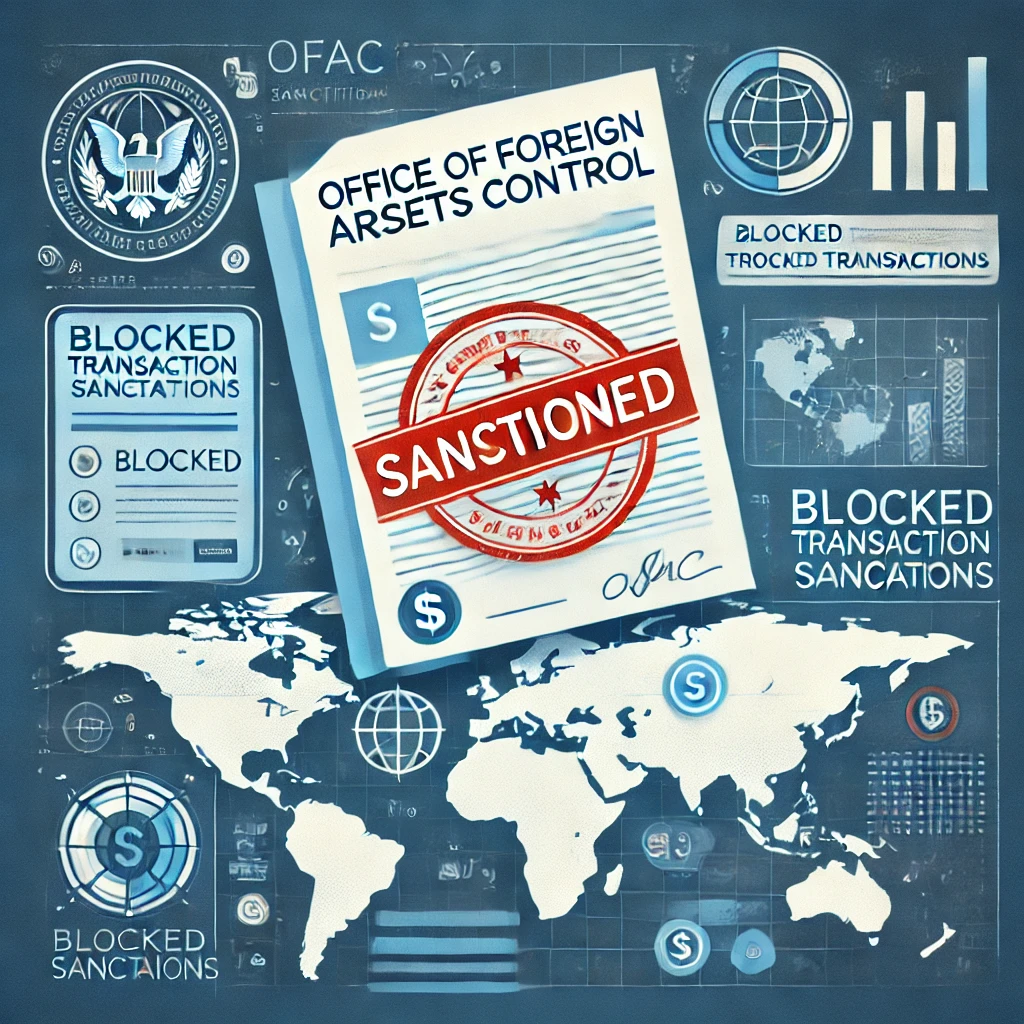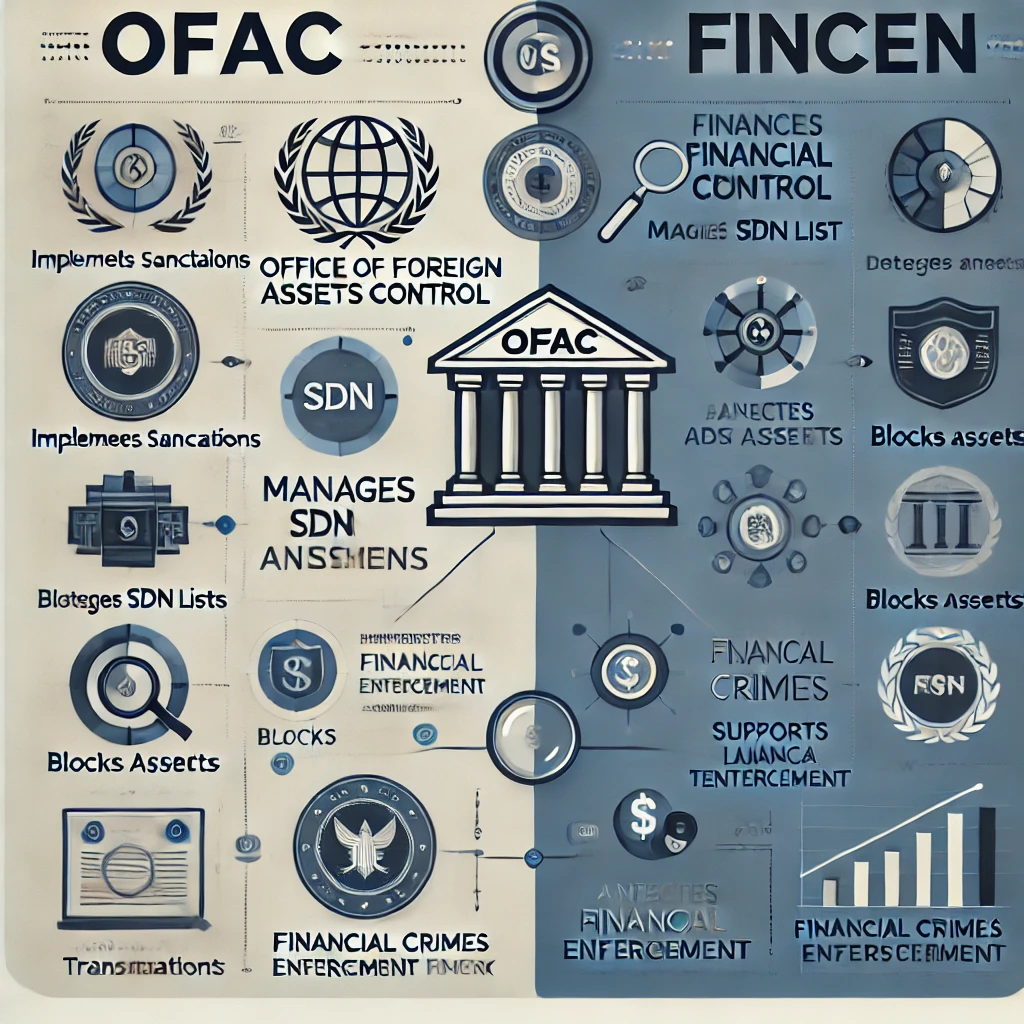What is the Difference Between OFAC and FinCEN?
OFAC implements economic sanctions, blocks the assets of individuals and organizations that threaten national security, and manages sanctions lists such as the SDN. It also issues OFAC licenses to authorize activities that are generally prohibited by sanctions, such as humanitarian missions.
FinCEN analyzes suspicious transactions to detect financial crimes. The main goal is to combat money laundering and terrorist financing.
OFAC works with sanctions, while FinCEN works with financial crimes. Both agencies ensure financial security, but have different focuses.
What is OFAC?
OFAC is the Office of Foreign Assets Control, which is part of the US Department of the Treasury. Its purpose is to impose economic and trade sanctions to protect national security and support U.S. foreign policy.
OFAC manages sanctions lists that include individuals and organizations associated with illegal activities or terrorism. The organization blocks assets and restricts financial transactions with entities on these lists.

What is FinCEN?
FinCEN is the Financial Crimes Enforcement Network of the U.S. Department of the Treasury. Its goal is to protect the financial system from abuse and combat money laundering and terrorist financing.
FinCEN collects, analyzes, and transmits data on suspicious transactions to help detect financial crimes. The organization works with banks and other institutions to identify suspicious activity and prevent illegal schemes.
The Key Functions of OFAC and FinCEN
The Office of Foreign Assets Control (OFAC) and the Financial Crimes Enforcement Network (FinCEN) are essential to maintaining the financial security of the United States. OFAC is primarily responsible for implementing sanctions designed to counter threats to national security, foreign policy, and the economy. This includes blocking the assets of individuals and organizations deemed dangerous or adversarial to the U.S. OFAC also manages and regularly updates critical sanctions lists, such as the Specially Designated Nationals (SDN) list. These measures ensure that targeted entities are effectively monitored and restricted.
On the other hand, FinCEN focuses on analyzing financial transactions to detect and prevent suspicious activities. This involves combating money laundering and terrorist financing through thorough investigations and data analysis. FinCEN works closely with financial institutions to promote transparency and accountability in financial transactions. This collaboration strengthens the integrity of the financial system. It also serves as a crucial component in combating illicit activities. Together, these agencies form a robust defense mechanism to protect the U.S. financial ecosystem from a wide range of threats.
Responsibilities of OFAC
OFAC is responsible for implementing and monitoring economic and trade sanctions imposed by the US government.
The primary responsibilities of the Office of Foreign Assets Control (OFAC) revolve around enforcing sanctions and maintaining financial security. One of its key tasks is the development and enforcement of sanctions against entities that pose a threat to security or violate international law. OFAC also manages and updates critical lists, such as the Specially Designated Nationals (SDN) list, to ensure sanctioned entities are accurately identified and monitored.
The agency freezes the financial resources of sanctioned individuals and companies, blocking their access to U.S. assets. Another significant aspect of OFAC’s work involves monitoring international financial transactions to detect and prevent violations of sanctions. To ensure the effective implementation of its policies, OFAC collaborates with companies and institutions, guiding them in adhering to and enforcing the established sanctions framework.
Responsibilities of FinCEN
FinCEN ensures the financial security of the United States by combating money laundering, terrorist financing, and other crimes.
The main responsibilities of FinCEN:
- Data collection and analysis: Receiving information about suspicious transactions.
- Detection of crimes: Analyzing data to identify money laundering and illegal activities.
- International cooperation: Sharing data with foreign partners to fight global crime.
- Regulation: Developing rules to prevent illegal activities.
- Supporting law enforcement: Providing information and expertise to investigate crimes.
How OFAC and FinCEN Collaborate
OFAC and FinCEN cooperate to ensure financial security and combat illegal activities. The Office of Foreign Assets Control (OFAC) and the Financial Crimes Enforcement Network (FinCEN) collaborate to ensure financial security and combat illegal activities. OFAC shares data on sanctioned individuals and entities with FinCEN, while FinCEN provides information on suspicious transactions. Together, they investigate financial crimes, including money laundering, terrorist financing, and sanctions evasion. They also exchange data with foreign partners to strengthen international efforts against financial crimes. FinCEN supports OFAC by providing analytical data to improve and update sanctions lists.
Major Differences Between OFAC and FinCEN
OFAC and FinCEN ensure financial security by performing different functions:
- Objective: OFAC imposes sanctions, freezes assets, and restricts activities. FinCEN fights money laundering and terrorist financing.
- Responsibilities: OFAC manages the SDN list and blocks resources. FinCEN analyzes transactions and works with law enforcement.
- Areas of influence: OFAC works with international sanctions, while FinCEN handles domestic security and global transactions.
- Tools: OFAC blocks assets and prevents transactions. FinCEN collects and analyzes data on suspicious transactions.

Examples of OFAC and FinCEN in Action
OFAC blocks terrorist assets and freezes funds of governments violating international law. For example, OFAC has been instrumental in freezing the assets of the Iranian government and associated entities under sanctions aimed at countering nuclear proliferation.
FinCEN targets money laundering schemes and provides critical financial intelligence. For instance, it played a significant role in uncovering the Panama Papers, exposing offshore companies used for tax evasion and money laundering.
Legal Advice
We help people effectively fight their offenders back and successfully defend their own stand!